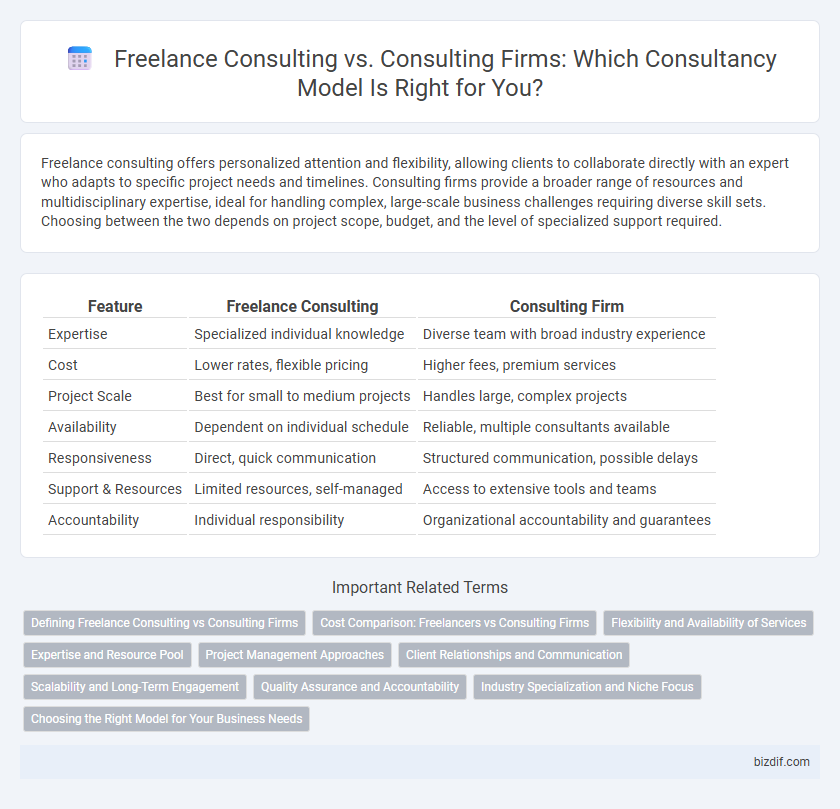Freelance consulting offers personalized attention and flexibility, allowing clients to collaborate directly with an expert who adapts to specific project needs and timelines. Consulting firms provide a broader range of resources and multidisciplinary expertise, ideal for handling complex, large-scale business challenges requiring diverse skill sets. Choosing between the two depends on project scope, budget, and the level of specialized support required.
Table of Comparison
| Feature | Freelance Consulting | Consulting Firm |
|---|---|---|
| Expertise | Specialized individual knowledge | Diverse team with broad industry experience |
| Cost | Lower rates, flexible pricing | Higher fees, premium services |
| Project Scale | Best for small to medium projects | Handles large, complex projects |
| Availability | Dependent on individual schedule | Reliable, multiple consultants available |
| Responsiveness | Direct, quick communication | Structured communication, possible delays |
| Support & Resources | Limited resources, self-managed | Access to extensive tools and teams |
| Accountability | Individual responsibility | Organizational accountability and guarantees |
Defining Freelance Consulting vs Consulting Firms
Freelance consulting involves independent professionals offering specialized expertise directly to clients, allowing for personalized services and flexible engagement terms. Consulting firms comprise teams of consultants providing a wide range of services through structured methodologies, leveraging collective knowledge and resources. The key distinction lies in the scale and organizational infrastructure, with freelance consultants emphasizing agility and firms focusing on comprehensive solutions.
Cost Comparison: Freelancers vs Consulting Firms
Freelance consultants typically charge lower hourly rates than consulting firms due to reduced overhead costs and streamlined operations. Consulting firms offer comprehensive services with specialized teams but often come with higher fees reflecting their broader resource allocation and brand reputation. Choosing between freelancers and firms depends on budget constraints and the complexity of project requirements, with freelancers providing cost-effective solutions for smaller projects.
Flexibility and Availability of Services
Freelance consulting offers unparalleled flexibility in scheduling and customized service delivery tailored to specific client needs, often allowing quicker response times and adaptability. Consulting firms provide a broader range of specialized expertise with resources available for ongoing projects, ensuring consistent availability and scalability. Clients seeking agile, personalized solutions may prefer freelancers, while those requiring comprehensive, multi-disciplinary support often benefit from consulting firms.
Expertise and Resource Pool
Freelance consulting offers specialized expertise tailored to niche projects, enabling agile and cost-effective solutions with direct client-consultant interaction. In contrast, consulting firms provide a broader resource pool, combining diverse skill sets and industry knowledge to tackle complex, large-scale engagements. The choice depends on project scope, budget, and the need for either focused expertise or multidisciplinary collaboration.
Project Management Approaches
Freelance consultants often adopt agile and flexible project management approaches tailored to the specific needs of clients, enabling rapid adaptation and personalized attention. Consulting firms typically leverage standardized, scalable methodologies such as PMP or PRINCE2 to ensure consistency and manage complex, multi-layered projects across diverse teams. The choice between freelance consulting and consulting firms impacts project delivery speed, customization, and resource allocation efficiency in project management.
Client Relationships and Communication
Freelance consultants often provide personalized, direct communication that fosters strong, flexible client relationships, allowing for tailored solutions and swift responses. Consulting firms typically offer structured communication channels and team-based support, ensuring consistent expertise but sometimes less individualized interaction. Clients seeking close collaboration and adaptability may prefer freelancers, while those requiring broad resources and specialized teams often choose consulting firms.
Scalability and Long-Term Engagement
Freelance consulting offers flexible scalability for short-term projects with minimal overhead, making it ideal for startups and small businesses seeking cost-effective expertise. Consulting firms provide structured scalability through dedicated teams and resources, supporting complex projects and long-term engagements with consistent deliverables. Long-term partnerships with consulting firms ensure sustained strategic alignment and continuous improvement, whereas freelancers may face capacity constraints limiting extended collaboration.
Quality Assurance and Accountability
Freelance consulting offers personalized accountability with direct client-consultant interaction, often resulting in tailored quality assurance processes specific to each project. Consulting firms provide structured quality assurance protocols backed by standardized metrics, team collaboration, and multi-level accountability mechanisms. Choosing between them depends on the need for customized solutions versus comprehensive, scalable quality control systems.
Industry Specialization and Niche Focus
Freelance consulting offers highly specialized expertise tailored to niche industries, allowing clients to access deep, focused knowledge without the overhead of a large firm. Consulting firms provide broad industry specialization through diverse teams, enabling comprehensive solutions across multiple sectors. Clients seeking targeted, industry-specific insights often benefit more from freelancers, while those requiring multidisciplinary approaches typically prefer the resources of consulting firms.
Choosing the Right Model for Your Business Needs
Freelance consulting offers personalized expertise and flexible engagement tailored to specific project needs, often at a lower cost and quicker turnaround than traditional consulting firms. Consulting firms bring extensive resources, diverse skill sets, and structured methodologies ideal for complex, large-scale challenges requiring comprehensive solutions. Evaluating business goals, budget, project scope, and desired level of support is essential to selecting the consulting model that maximizes value and impact.
Freelance Consulting vs Consulting Firm Infographic

 bizdif.com
bizdif.com